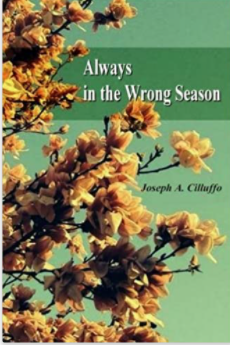Always in the Wrong Season
Kelsay Books/Aldrich Press
$17.00
You can purchase a copy here.
Reviewed by Eileen D’Angelo
1986
Here, where it is always 1986
I can still kiss your cheek, Dad
and marvel at the stubble grown men grow.
Tender, I can still shave with a whisper.
Our hand is the piece of iron
worried fingers hold to keep evil at bay.
The bird we saw? The one
you said was an osprey
and I thought was a peregrine.
It’s still flying. It hasn’t yet dropped
the thick grey fist of the clam
onto the dock to crack open its shell,
prize out the pulpy flesh. Our amazement
at that is still ahead of us.
Couldn’t I have come to this place
from somewhere else? My words
are unholy, or at least unwise.
But here, I am still a child
and permitted to be a fool.
It’s 1986. Those cries
are just the dog barking.
He hears the garage door opening.
It’s you, coming home.
There is such a clarity and tenderness in Joseph’s Cilluffo’s poem, “1986”, an excerpt from his first collection of poems, Always in the Wrong Season. The poems in this book are closer to invocation and meditation than most prayers. Cilluffo is alert, always present in his surroundings, tuned into the nature of earth and the nature of humanity. Did the incident with the bird dropping the clam on the dock actually happen—or is it a strong metaphoric image offered by the poet to describe something he wants us to understand? Either way, it is genius to put the lines into this poem, because it works perfectly and it can mean so many things. Cilluffo skillfully freezes time in this poem to tell his story, chooses a moment to remember, and colors it with his current perceptions and the resulting truth. The bird is a catalyst here, showing unique intelligence and ingenuity in finding a way to crack open the clam’s shell, amazing the onlookers. What does a clam do? It holds itself tightly closed. What is its gift? To take a small grain of sand and layer upon layer create a pearl, to protect itself from the rough grit. Isn’t that what we all try to do, and what the poet has done in this poem: take the rough patches and difficult moments in his life and turn them into lessons or valuable life experiences? Transform them into something other than setbacks?
Whether the objects in this poem are real or imaginary, they speak to the relationship, how communication between a father and son can be as tightly held within as the clam inside its shell. And what if we could transcend the struggle? Would we? The poet’s words ring so true and so familiar: “Couldn’t I have come to this place/ from somewhere else?” It is such a universal thought, phrased simply, but eloquently, a question that everyone asks themselves at least once in their own lives. Did I have to experience the hard and difficult times to fully comprehend, or to come to a place of understanding? Why must a certain level of pain precede insight? And if it was possible to slip past those challenging moments, would we do it? The ultimate question follows: if we did it—would the subsequent feelings of acceptance and peace lose their meaning? This is one example of the moving poems in his collection, woven with religious references and spirituality, and at the very same time, brimming with an understated sensuality. Poems that are heart-breaking and uplifting, sometimes all at once, within a few lines.
Eileen M. D’Angelo is Founder/Executive Director of the Mad Poets Society, and Founder/Managing Editor of the literary magazine, Mad Poets Review (1990-2010). Since 1987, she produced over 1,500 special events, including readings, slams, conferences, workshops, bonfires and literary festivals in the Delaware Valley. In 2018, she was the subject of an anthology and tribute by Philadelphia’s Moonstone Arts Center. Twice nominated for a PA Governor’s Award in the Arts, D’Angelo received two Pushcart Prize nominations from Verse Magazine and Schuylkill Valley Journal. Poetry, op-eds, and book reviews have been published or forthcoming in The Philadelphia Inquirer, News of Delaware County, Rattle, and other publications.


